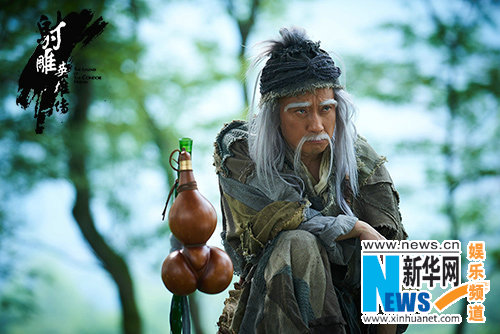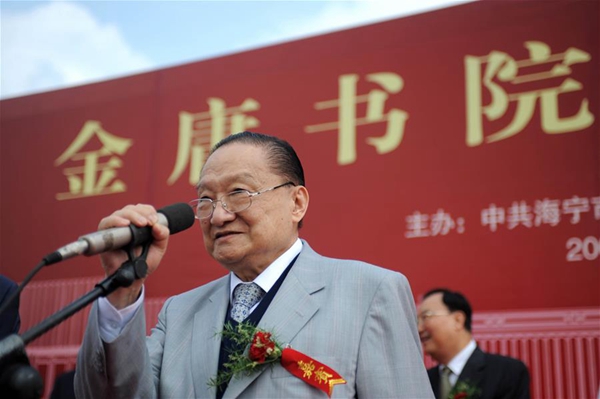
作者:王晓辉
长啸是中国古人的一种歌吟方式,撮口发出悠长响亮的声音,没有实际内容,不遵守既定格式,或喜或悲,只随心所欲吐露出一腔心曲。岳飞《满江红》:“仰天长啸,壮怀激烈。” 王维《竹里馆》:“独坐幽篁里,弹琴复长啸。” 《三国志·蜀书》记载,诸葛亮“每晨夜从容,常抱膝长啸”。在中国古代文学作品中,“长啸”二字出现频率极高,多为名人高士月夕风晨之际独自抒发情怀,可见,长啸与诗词歌赋琴棋书画一样,是一件雅事。但金庸偏偏将这件雅事用在读者意想不到的地方。
《射雕英雄传》第十八回,西毒欧阳锋到桃花岛为侄子欧阳克求亲,北丐洪七公也来到桃花岛为郭靖和黄蓉说亲,东邪西毒北丐三大高手齐聚桃花岛,自然少不了一番比拼。一般高手过招,除了拳脚兵刃,就是招数内力,但金庸别出心裁,为三大高手设计了一场匪夷所思的比武较量。欧阳锋弹奏铁箏,黄药师吹奏洞箫,洪七公发出长啸,琴音、箫声和长啸带着三大高手的内力缠斗在一起,既惊心动魄,又高雅别致,让读者目眩神驰,不能自已。

《射雕》第十八回:
“只听得筝声渐急,到后来犹如金鼓齐鸣、万马奔腾一般,蓦地里柔韵细细,一缕箫声幽幽地混入了筝音之中,郭靖只感心中一荡,脸上发热,连忙镇慑心神。铁箏声音虽响,始终淹没不了箫声,双声杂作,音调怪异之极。铁箏犹似巫峡猿啼、子夜鬼哭,玉箫恰如昆冈凤鸣,深闺私语,此高彼低,彼进此退,不相上下......
突然间远处海上隐隐传来一阵长啸之声。黄药师和欧阳锋同时心头一震,箫声和筝声登时都缓了。欧阳锋挥手弹筝,铮铮两下,声如裂帛,远处那啸声忽地拔高,与他交上了手。过不多时,黄药师的洞箫也加入团战,箫声有时与长啸争持,有时又与筝音缠斗,三种声音此起彼伏,斗在一起。这时发啸之人已近在身旁树林之中,啸声忽高忽低,时而如龙吟狮吼,时而如狼嗥枭鸣,或若长风振林,或若微雨湿花,极尽千变万化之致。箫声清亮,筝声凄厉,却也各呈妙音,丝毫不落下风。三般声音纠缠在一起,斗得难解难分。”
这哪里是比武,简直是一场音乐盛宴!也只有金庸和金庸的想像力,才能设计出如此文艺范儿的武打场面。看了金庸的武侠小说,我才明白外国人为什么把中国功夫叫作Martial Art,因为它就是Art。
Gigi Chang英译:
Viper Ouyang's playing had accelerated to the point where it was impossible to distinguish between individual notes. A wall of sound pressed into Guo Jing, as if ten thousand horses were galloping towards him or hundreds of battle drums were being beaten. Now and again, a gentle crooning rose above the twang of the zither, growing more confident and persistent. It brought a flush to Guo Jing's face and a flutter in his chest, prompting him to turn his focus back to controlling his senses.
However loud the Zheng was, it failed to drown out the murmur of the Xiao. Each Master held firm to his own tune. Together, they produced a raucous discordance.
The iron zither was the call of monkeys and apes in a remote mountain range, the hoot of owls in a dark wood. The jade flute was songs under the spring sun, whispers in a maiden's chamber. When one tune rose in pitch, the other descended. When one reached a crescendo, the other fell all but silent. Neither succeeded in dominating the other......
At this decisive point, a whistle wafted in from the sea.
It sent a shockwave through the two Masters and their music faltered for a moment. The whistler must be on a boat nearing the island.
Viper Ouyang struck the Zheng twice, sending forth a tremolo so violent that it could tear cloth. The newcomer accepted the challenge by skipping effortlessly to a very high note.
Apothecary Huang joined in. His flute flitted between grappling with the whistle and contending with the zither.
A third martial great had arrived.
Now the whistle came form the woods. Dipping and soaring, it roared with the might of tigers and lions, it neighed and brayed like a horse or a donkey. It was like the wind blowing through a forest, or a drizzle caressing petals. There was infinite variety to its tones.
The flute answered in a clear and gentle voice. The zither rattled and rasped with melancholic menace. Each Master stood firm. No one could gain the upper hand.
金庸的这段描写,不吝笔墨,极尽铺陈,对读者来说是莫大的享受,但对译者来说却不啻于一场灾难。首先,如何翻译“长啸”就是一个大大的难题。许渊冲先生用Towards the skies, I heave long sighs 来翻译岳飞的“仰天长啸”;Giles将王维的“独坐幽篁里,弹琴复长啸”译作 Beneath the bamboo grove, alone, I seize my flute and sit and croon。long sigh是长叹,croon是低吟,这两种译法是翻译名家根据诗词的意境、情绪和音韵作出的变通,但都不是真正意义上的“长啸”。常见的汉英字典一般把“长啸”译为long and loud cry,属于解释性的翻译,倒译回去就变成了“呼喊”。Gigi Chang用whistle一词,虽有差距,但恐怕也没有更好的选择了。人发出的声音,如果不是歌唱,不是呼喊,又不是哼哼或者咳嗽,也只有whistle能与黄药师的箫声和欧阳锋的筝声抗衡了,所以,洪七公不仅是武学泰斗,还应该是一位口技大师。

金庸用了至少十个四字成语来描写武林“三大男高音”的比拼:金鼓齐鸣,万马奔腾,巫峡猿啼,子夜鬼哭,昆冈凤鸣,深闺私语,龙吟狮吼,狼嗥枭鸣,长风振林,微雨湿花。从字面的气势和变化上看,简直就是一部大型交响乐,只不过演出场景不在金色大厅而在东海桃花岛。
译者Gigi Chang在翻译过程中费了很多心思,几乎所有的四字成语都译出来了,而且有的还译得相当巧妙。如第一句,“只听得筝声渐急,到后来犹如金鼓齐鸣、万马奔腾一般。” 译者通过郭靖的感受翻译出“金鼓齐鸣,万马奔腾”的气势:Viper Ouyang's playing had accelerated to the point where it was impossible to distinguish between individual notes. A wall of sound pressed into Guo Jing, as if ten thousand horses were galloping towards him or hundreds of battle drums were being beaten. 这样处理要比将成语译出并堆砌在一起要好得多。
最大的难题出在“子夜鬼哭”、“昆冈凤鸣”和“狼嗥枭鸣”的转换上。鬼怎么哭,凤凰怎么叫,我们谁也不知道,所以,Gigi Chang用the hoot of owls in a dark wood (夜猫子叫)替换了“子夜鬼哭”,把“昆冈凤鸣”译成了song under the spring sun。前者可以理解,但后者实际上变成改写和创作了,值得商榷。原文中金庸形容洪七公的啸声如龙吟狮吼,狼嗥枭鸣,但译者已经把“枭鸣”,也就是“夜猫子叫”借给了欧阳锋的筝声,用来替换“夜半鬼哭”, 无奈之下,又找了两种动物,将狼和枭换成了马和驴:Dipping and soaring, it roared with the might of tigers and lions, it neighed and brayed like a horse or a donkey。这么做,动作幅度有点儿偏大了,而且用驴叫比拟洪七公的长啸,好像不太合适,他七大爷在天之灵若知此事,定然不爽。
动手做过翻译的人都知道,这是一项极难的事,更何况还是翻译大师的作品。Gigi Chang能够有如此情怀,付出如此巨大的努力,殊为不易,值得我们学习和尊敬。
很多跨文化的东西是无法等效翻译的,或者理论上说得通,但实际操作中根本做不到。如果有哪位高手能把金庸武侠小说里的功夫,如落英缤纷掌,黯然销魂掌,庖丁解牛掌,天山六阳掌,五罗轻烟掌,飘雪穿云掌,金刚般若掌,还有什么兰花拂穴手,天山折梅手,慈悲千叶手,千蛛万毒手,三无三不手,龙爪手,凤爪手,波罗蜜手,都能准确优美地译成英文,而且让外国人一看就懂,国家授予他一个“跨文化大师”称号或者“五一”劳动奖章,毫不为过。
Go to Forum >>0 Comment(s)